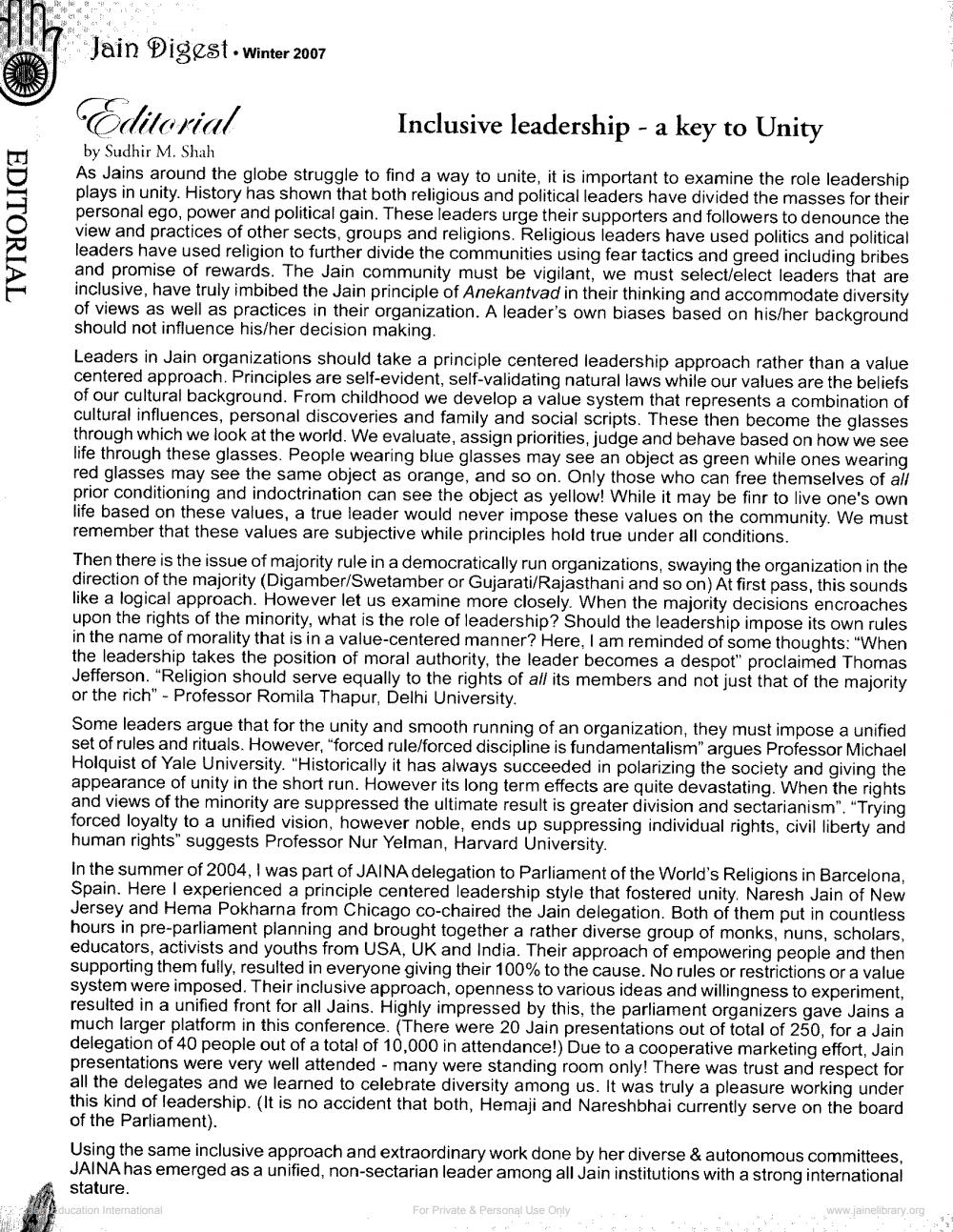Book Title: Jain Digest 2007 11 2 Author(s): Federation of JAINA Publisher: USA Federation of JAINA View full book textPage 6
________________ Jain Digest. Winter 2007 Editorial Inclusive leadership - a key to Unity EDITORIAL by Sudhir M. Shah As Jains around the globe struggle to find a way to unite, it is important to examine the role leadership plays in unity. History has shown that both religious and political leaders have divided the masses for their personal ego, power and political gain. These leaders urge their supporters and followers to denounce the view and practices of other sects, groups and religions. Religious leaders have used politics and political leaders have used religion to further divide the communities using fear tactics and greed including bribes and promise of rewards. The Jain community must be vigilant, we must select/elect leaders that are inclusive, have truly imbibed the Jain principle of Anekantvad in their thinking and accommodate diversity of views as well as practices in their organization. A leader's own biases based on his/her background should not influence his/her decision making Leaders in Jain organizations should take a principle centered leadership approach rather than a value centered approach. Principles are self-evident, self-validating natural laws while our values are the beliefs of our cultural background. From childhood we develop a value system that represents a combination of cultural influences, personal discoveries and family and social scripts. These then become the glasses through which we look at the world. We evaluate, assign priorities, judge and behave based on how we see life through these glasses. People wearing blue glasses may see an object as green while ones wearing red glasses may see the same object as orange, and so on. Only those who can free themselves of all prior conditioning and indoctrination can see the object as yellow! While it may be finr to live one's own life based on these values, a true leader would never impose these values on the community. We must remember that these values are subjective while principles hold true under all conditions. Then there is the issue of majority rule in a democratically run organizations, swaying the organization in the direction of the majority (Digamber/Swetamber or Gujarati/Rajasthani and so on) At first pass, this sounds like a logical approach. However let us examine more closely. When the majority decisions encroaches upon the rights of the minority, what is the role of leadership? Should the leadership impose its own rules in the name of morality that is in a value-centered manner? Here, I am reminded of some thoughts: "When the leadership takes the position of moral authority, the leader becomes a despot" proclaimed Thomas Jefferson. "Religion should serve equally to the rights of all its members and not just that of the majority or the rich" - Professor Romila Thapur, Delhi University. Some leaders argue that for the unity and smooth running of an organization, they must impose a unified set of rules and rituals. However, "forced rule/forced discipline is fundamentalism" argues Professor Michael Holquist of Yale University. "Historically it has always succeeded in polarizing the society and giving the appearance of unity in the short run. However its long term effects are quite devastating. When the rights and views of the minority are suppressed the ultimate result is greater division and sectarianism". "Trying forced loyalty to a unified vision, however noble, ends up suppressing individual rights, civil liberty and human rights" suggests Professor Nur Yelman, Harvard University. In the summer of 2004, I was part of JAINA delegation to Parliament of the World's Religions in Barcelona, Spain. Here I experienced a principle centered leadership style that fostered unity. Naresh Jain of New Jersey and Hema Pokharna from Chicago co-chaired the Jain delegation. Both of them put in countless hours in pre-parliament planning and brought together a rather diverse group of monks, nuns, scholars, educators, activists and youths from USA, UK and India. Their approach of empowering people and then supporting them fully, resulted in everyone giving their 100% to the cause. No rules or restrictions or a value system were imposed. Their inclusive approach, openness to various ideas and willingness to experiment, resulted in a unified front for all Jains. Highly impressed by this, the parliament organizers gave Jains a much larger platform in this conference. (There were 20 Jain presentations out of total of 250, for a Jain delegation of 40 people out of a total of 10,000 in attendance!) Due to a cooperative marketing effort, Jain presentations were very well attended - many were standing room only! There was trust and respect for all the delegates and we learned to celebrate diversity among us. It was truly a pleasure working under this kind of leadership. (It is no accident that both, Hemaji and Nareshbhai currently serve on the board of the Parliament). Using the same inclusive approach and extraordinary work done by her diverse & autonomous committees, JAINA has emerged as a unified, non-sectarian leader among all Jain institutions with a strong international stature. ducation Intemational For Private & Personal use only www.jainelibrary.orgPage Navigation
1 ... 4 5 6 7 8 9 10 11 12 13 14 15 16 17 18 19 20 21 22 23 24 25 26 27 28 29 30 31 32 33 34 35 36 37 38 39 40
